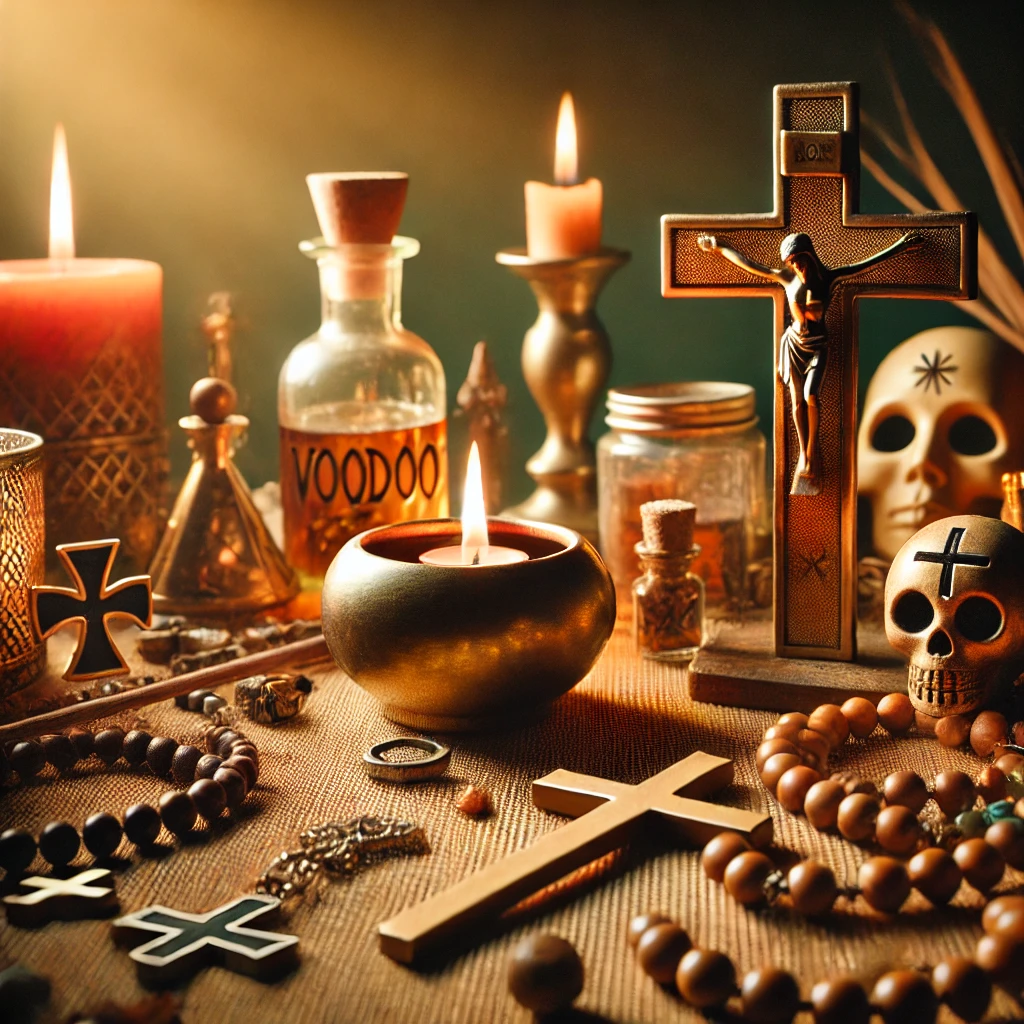For centuries, Voodoo and Christianity have been portrayed as opposing forces, with many believing that the two religions are incompatible, even at odds. However, in places like Haiti and parts of the Caribbean and the southern United States, Voodoo and Christianity have not only coexisted but have also blended together in surprising ways. So, is the relationship between Voodoo and Christianity one of conflict, or can the two religions coexist in harmony?
In this article, we will explore the historical interactions between Voodoo and Christianity, the ways in which the two have influenced each other, and how practitioners of both manage to reconcile their faiths.
Naturopathy Peppermint Essential Oil, Therapeutic Grade, Premium Quality Perfect for Aromatherapy (16oz, Peppermint)
$17.99 (as of February 17, 2026 09:13 GMT +00:00 - More infoProduct prices and availability are accurate as of the date/time indicated and are subject to change. Any price and availability information displayed on [relevant Amazon Site(s), as applicable] at the time of purchase will apply to the purchase of this product.)The Myth of Conflict: Voodoo vs. Christianity
Historically, many have viewed Voodoo and Christianity as opposing spiritual systems. This perception stems largely from the influence of European colonizers, missionaries, and Hollywood portrayals that framed Voodoo as a “pagan” or “demonic” practice. These portrayals often pit Voodoo against Christianity, casting one as the light and the other as darkness.
Common Misconceptions:
- Voodoo as Demonic: Many Christian colonizers and missionaries labeled Voodoo as “demonic” or “evil” because it did not conform to Christian beliefs and practices.
- Voodoo and Magic: Voodoo’s rituals and use of objects such as dolls and charms were often misunderstood as acts of sorcery or witchcraft, leading to further demonization of the religion.
- Exclusivity of Faiths: It has often been assumed that a person must choose between Christianity and Voodoo, with no room for the two to coexist in harmony.
These myths have contributed to the belief that Voodoo and Christianity are inherently opposed. However, a closer look at the historical and cultural development of these religions tells a different story.
The Historical Context: How Voodoo and Christianity Intersected
The relationship between Voodoo and Christianity dates back to the transatlantic slave trade. Enslaved Africans who were forcibly taken to the Caribbean, North America, and South America brought their spiritual traditions with them. In places like Haiti, enslaved Africans were forced to convert to Christianity by French colonizers, yet they managed to preserve elements of their ancestral religions, blending them with the Catholicism imposed upon them.
This blending, or syncretism, allowed for the survival of African spiritual practices under the guise of Catholic rituals. Enslaved people found ways to practice Voodoo in secret, often hiding their deities, or lwa, behind the images of Catholic saints.
Syncretism in Haitian Vodou:
- Saints and Lwa: In Haitian Vodou, many lwa (spirits) are associated with Catholic saints. For example, Erzulie Freda, the spirit of love, is often associated with Our Lady of Sorrows, while Papa Legba, the gatekeeper between the spiritual and physical worlds, is linked to Saint Peter, who holds the keys to the gates of heaven.
- Catholic Prayers and Voodoo Rituals: Many Vodou practitioners incorporate Catholic prayers, hymns, and symbols into their rituals. For instance, it is common to see Vodou altars adorned with images of Catholic saints, crucifixes, and candles, alongside offerings to the lwa.
This blending of Voodoo and Christianity was not an act of defiance but rather a way for enslaved Africans to maintain their spiritual practices in a hostile environment. Over time, this syncretism became a defining feature of Haitian Vodou and other forms of Voodoo in the Caribbean and Louisiana.
Fact:
The relationship between Voodoo and Christianity is not one of strict opposition but of adaptation and coexistence, particularly in regions where African spiritual traditions blended with Catholicism.
Christianity’s Influence on Voodoo
While Voodoo has retained many of its African elements, it has also been influenced by Christianity, particularly Catholicism. This influence can be seen in several aspects of Voodoo practice:
- Saint Worship: The use of Catholic saints in Voodoo is one of the most obvious examples of syncretism. In both religions, saints (or lwa) act as intermediaries between humans and the divine. Voodoo practitioners may pray to Catholic saints while also calling upon the lwa for guidance and protection.
- Catholic Sacraments and Voodoo Rituals: Some Voodoo rituals have adopted Catholic sacramental elements, such as the use of holy water, incense, and candles. These items are believed to carry spiritual power and are used to bless participants and spaces during Voodoo ceremonies.
- Christian Morality: Many Vodou practitioners also identify as Christians, particularly Catholics, and incorporate Christian moral teachings into their lives. For these practitioners, the two faiths are not mutually exclusive but complementary. They may attend Catholic Mass, receive sacraments, and pray to Jesus Christ while also participating in Voodoo rituals and honoring their ancestors and lwa.
Al Rehab Choco Musk Marshmallow – Sweet Chocolate-Vanilla Concentrated Perfume Oil Roll-On for Unisex, 0.2 Ounce / 6ml
$4.49 (as of February 17, 2026 09:13 GMT +00:00 - More infoProduct prices and availability are accurate as of the date/time indicated and are subject to change. Any price and availability information displayed on [relevant Amazon Site(s), as applicable] at the time of purchase will apply to the purchase of this product.)Voodoo and Christianity Today: Harmony or Tension?
In places like Haiti, many people practice both Vodou and Christianity without seeing any conflict between the two. For these individuals, Vodou provides a way to connect with their ancestors and the spirit world, while Christianity offers them salvation and a relationship with Jesus Christ.
Voodoo as a Complement to Christianity:
- Dual Worship: It is not uncommon for individuals to participate in both Catholic Mass and Vodou ceremonies. For many practitioners, Vodou is seen as a practical, day-to-day religion that addresses immediate concerns like health, protection, and prosperity, while Christianity addresses larger spiritual questions of salvation and eternal life.
- Mutual Respect: Many Vodou priests (known as houngans) and priestesses (known as mambos) respect Christianity and encourage their followers to engage with both traditions. In this way, Vodou and Christianity are seen as complementary paths to spiritual fulfillment.
Tensions and Misunderstandings:
- Despite the harmony found in some regions, there is still tension between certain Christian denominations and Vodou practitioners. Some Christian groups, particularly Evangelical Protestants, view Vodou as incompatible with their faith, often condemning it as pagan or demonic.
- This tension is often fueled by the same misunderstandings that originated during the colonial era, with many people continuing to associate Vodou with evil or dark magic.
Fact:
For many practitioners, Voodoo and Christianity are not mutually exclusive. They see both religions as offering different but complementary forms of spiritual guidance.
Understanding Syncretism: A Blend, Not a Conflict
Syncretism—the blending of different religious traditions—has been a common feature of human religious history, and the relationship between Voodoo and Christianity is a prime example. In places like Haiti, Voodoo developed alongside Christianity, and the two faiths became intertwined. Many practitioners do not see a contradiction in practicing both religions; rather, they see them as serving different roles in their spiritual lives.
Examples of Syncretism in Practice:
- Prayer to Both Saints and Lwa: A Vodou practitioner may pray to Catholic saints for intercession while also calling upon lwa for specific needs, such as protection or healing. The two practices exist side by side, each addressing different spiritual aspects.
- Attending Mass and Vodou Ceremonies: Many Vodou practitioners regularly attend Catholic Mass and receive sacraments, such as Communion, while also participating in Vodou rituals. For these individuals, there is no sense of conflict between the two; instead, each tradition provides a different avenue for spiritual fulfillment.
Fact:
Syncretism allows practitioners to draw on the strengths of both Christianity and Voodoo, creating a unique and harmonious religious practice that honors both traditions.
Voodoo and Christianity: A Personal Journey
For many individuals, the blending of Voodoo and Christianity is a deeply personal journey. Some may identify primarily as Christians but incorporate elements of Voodoo into their spiritual lives, while others may see themselves as Vodou practitioners who also respect and practice Christianity. The key is that, for many, these two traditions are not seen as mutually exclusive, but as complementary ways of understanding the divine and navigating life’s challenges.
Fact:
The relationship between Voodoo and Christianity varies depending on the individual and the region, but for many, the two religions coexist in harmony, offering different paths to spiritual guidance.
Voodoo Shrunken Head | Shrunken Head Prop | Halloween Scary Heads Prop | Mini Scary Voodoo Heads | Creepy Halloween Novelty Decor | Witch Doctor Decor | Spooky Haunted House Decorations | Black | 3"
$9.99 (as of February 17, 2026 10:36 GMT +00:00 - More infoProduct prices and availability are accurate as of the date/time indicated and are subject to change. Any price and availability information displayed on [relevant Amazon Site(s), as applicable] at the time of purchase will apply to the purchase of this product.)Myth or Harmony?
The idea that Voodoo and Christianity are inherently at odds is largely a myth, rooted in colonial history and cultural misunderstanding. In reality, the two religions have coexisted and influenced each other for centuries, particularly in places like Haiti and New Orleans. Through the process of syncretism, Voodoo and Christianity have blended into a unique spiritual practice that allows individuals to honor both their ancestral traditions and their Christian faith.
While there may still be tensions between some Christian denominations and Voodoo, for many practitioners, the two religions exist in harmony, each offering a different form of spiritual support.
Related Articles
- Voodoo Priests and Priestesses: Guardians of Tradition or Agents of Magic?
- Voodoo as a Force for Good: Misunderstood Spirituality
- Do Voodoo Curses Exist? What You Should Know
- The Influence of African Voodoo on Modern Practices
- Is Voodoo Legal? Understanding the Rights of Voodoo Practitioners
More from This Category
- The Truth About Voodoo Rituals: What Really Happens During a Ceremony?
- How Voodoo Heals: The Spiritual and Physical Aspects of Voodoo Healing
- Voodoo Spells: What They Really Mean and How They Work
- The Role of Spirits in Voodoo: Fact or Fiction?
- Voodoo and Christianity: Myth or Harmony?
Additional Resources
- Voodoo in Hollywood: How Movies Get It Wrong
- The Difference Between Haitian Vodou and Louisiana Voodoo
- Voodoo Dolls: Myth vs. Reality
- Is Voodoo Evil? The Truth Behind the Stereotypes
- Debunking Common Voodoo Myths: Separating Fact from Fiction



